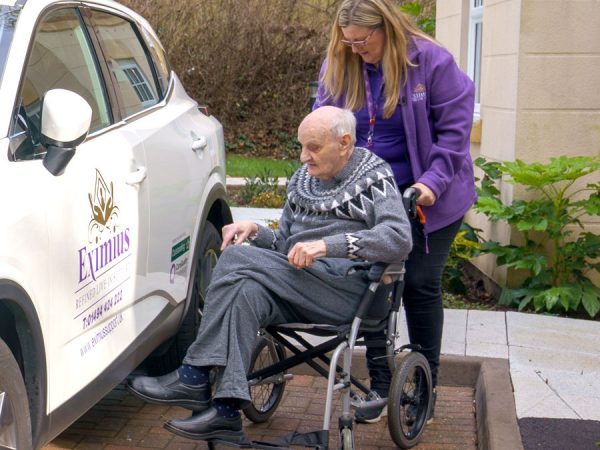Domiciliary, Residential, or Live-in Care – how to understand which is the right choice for you

It can be overwhelming trying to understand, let alone decide between, the different care options available for you or your loved one. Every family has its own unique set of circumstances, concerns, and resources behind its journey to locate the right type of care. We recognise it can be challenging when making your choice.
We hope our comprehensive list of the pros and cons of Domiciliary Care versus Residential Care versus Live-in Care can help you make the right decision for you.
Domiciliary Care
Domiciliary care can also be known as hourly care and is for an agreed, fixed number of hours a day or week. A carer will visit you or your loved one in their own home and assist with meals, cleaning, shopping, and company within those set hours.
Advantages of domiciliary care
- Domiciliary care can enable you or your loved one to maintain some independence whilst staying within your own home.
- Remaining in familiar surroundings can provide stability and a sense of normalcy.
- It can be a flexible solution – with the type and frequency of care given able to be increased or decreased as needed.
- Domiciliary care is more widely known and can be more affordable than other care options as you pay only for your essential care needs.
Disadvantages of domiciliary care
- Domiciliary care can suffer from a lack of consistency or higher turnover of care workers which can be unsettling for those in receipt of the care. It is harder to cope with or build up trust with different people coming and going.
- Care is only on hand at the agreed times which can cause concerns of vulnerability and safety if help is unexpectedly needed outside of these hours.
- The type of care available can be limited and less suitable for more complicated health conditions.
Residential care
Residential care is usually for older people who may need support with day-to-day tasks such as washing or dressing but don’t require more specialist nursing care or dementia support.
Advantages of residential care
- Residential care can offer companionship as residents are living with people often of a similar age, and in similar circumstances.
- There can be a range of organised activities available designed to stimulate the mind and the body such as light exercise, quizzes, arts and crafts, etc.
- Trained and qualified personal and medical care staff are on duty round the clock.
- Residents will have a room to call their own which can be made to feel like home, with personalised touches.
- There is no need for you or your loved one to have to worry about grocery shopping, paying bills, gardening, or the general upkeep of a property.
Disadvantages of residential care
- The loss of independence and control can be hard to adjust to. Everyday occurrences that require support must be timetabled with staff availability and the needs of the other residents considered. This can mean a schedule for what time you get up and go to bed to what and when you eat.
- There can be restrictions on accessing the world outside of the residential home, which will be dependent upon staff and facilities required to support any planned excursions.
- Although residential care homes are staffed 24/7, the ratios of carers to residents and staff shift patterns can mean help is not always immediately available.
- Despite living in a community with lots of people, the absence of family and friends can result in loneliness.
- Feelings of displacement and rejection can be experienced in those who are no longer living in their own homes.
- The location of a residential home can result in visits from family and friends being less spontaneous and more restricted.
Residential care homes are typically the most expensive care option.
Live-in care
Live-in care provides support for day-to-day life by professional carers, or companions, who live with client’s allowing them to remain in their own homes. Personal, medical, and domestic needs are taken care of and this can comprise of live-in day care, live-in night care, live-in clinical care and live-in respite care.
Advantages of live-in care
- A bespoke care plan can be created and individually tailored around the personal, medical, and domestic needs of you or your loved one.
- Live-in care enables independence and safety for longer in the comfort of home, surrounded by familiar, personal belongings and memories. This can have an incredibly positive impact on general health and wellbeing.
- Live-in care can be built around an existing routine; making sure the favourite television programme isn’t missed, the regular catch ups with children or grandchildren can go ahead or the weekly trip to the Post Office still takes place. Clients can enjoy their own outside space, keep loved pets with them, and hobbies and interests can continue to be pursued.
- Visits with friends, family and connections with the local community can continue uninterrupted and unscheduled.
- Live-in care provides consistency in the care workers who are coming into the home. The same handful of familiar faces supporting you or your loved one, who learn the likes and dislikes, can quickly build into a trusting and reliable relationship, as well as companionship.
- Because the care is within the home, there is peace of mind that help is always immediately at hand, 24/7.
- It can be a particularly good and affordable option for couples, where maybe one or both need help, enabling them to stay together for longer, within their own home.
- Live-in care can be a cost effective and safe alternative to other types of care.
Disadvantages of live-in care
- Homes need to be able to accommodate the space and facilities needed for a care worker, which will depend upon the type of live-in care being used. For example, a private bedroom may be required, with clean bedding and towels and internet access.
- Living with a stranger can be challenging for some to begin with. At Eximius, we carefully select a carer or companion who has the experience, training, and personality to match the needs of our clients. One huge advantage our clients enjoy, is they get to know their carer or companion well, rather than having to cope with different people coming and going. Their carer or companion becomes an integral part of their life and a close family friend. This is particularly relevant when our clients require assistance with personal care. Having a companion that you know and trust to help in this sensitive situation is important.
- There can be anxiety when a trusted and familiar care worker goes on holiday or is unwell and unable to work. At Eximius, when your Live-In Care Worker is due to go on a break, a second Care Worker will be introduced. A number of Eximius carer profiles are sent over to the client before handover takes place. Profiles are carefully matched to the client to ensure they share similar interests and hobbies. This process helps ensure that breaks are covered correctly, a client is satisfied and a smooth handover occurs. If a new carer is being introduced, then we will aim to send a supervisor as well for a smooth handover and to make sure nothing is missed.
Next steps
If a recent visit raised questions for you read our blog post.
Whatever you decide, it’s essential to do your research and work with a care provider with a proven track record of delivering exceptional services geared to each individual client. Every family has a unique set of circumstances and resources driving their journey to find the right care provision and it’s important all your questions and concerns are addressed.

Get in touch. We can help
If you or a loved-one would like to understand more about the different care options available, please contact us for further information. We’d love to help.